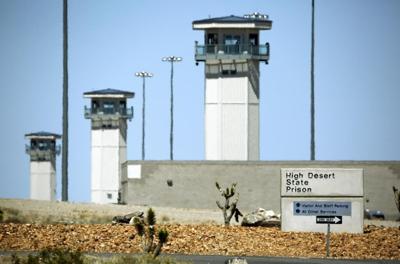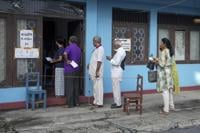LAS VEGAS (AP) ÔÇö The mother of a Nevada inmate who died a year ago after he was beaten by corrections officers has filed a lawsuit accusing prison staff of conspiring with the coroner's office in Las Vegas to cover up the death.
Annette Walker alleges in the lawsuit filed late Thursday in Clark County District Court that her son, Christian, was viciously beaten by guards on at least two separate occasions and left to die at High Desert State Prison near Las Vegas, and that a larger pattern of excessive force exists within the stateÔÇÖs prison system.
ÔÇťThis lawsuit stands for something much, much larger than just Christian,ÔÇŁ the lawsuit says. ÔÇťIt stands for all those who came before and will come after Christian Walker.ÔÇŁ
Walker's face was swollen and smeared with blood when he died in custody last April, according to the lawsuit and an unredacted copy of his autopsy report obtained by The Associated Press. He also suffered head trauma and other injuries to his torso, neck and extremities.
The medical examiner concluded it was a natural death caused by heart problems.
Lary Simms, a forensic pathology expert who worked for 25 years as a medical examiner in Las Vegas and Chicago, reviewed Walker's autopsy report and medical records for the plaintiffs. He recommended a ÔÇťcomplete re-evaluationÔÇŁ of Walker's death.
The medical examiner's ÔÇťmicroscopic descriptionÔÇŁ of WalkerÔÇÖs apparent heart problems in the autopsy report doesn't square with the final ruling, Simms wrote in an affidavit filed with the lawsuit.
The state Department of Corrections and its director, James Dzurenda, several prison administrators, medical staff and unnamed guards, along with the Clark County coroner's office, are listed as defendants. Both the corrections department and the county declined to comment Friday.
Walker was 44 when he died on April 15, 2023. He had spent more than two dozen years behind bars after being convicted of second-degree murder in the 1997 death of his then-girlfriend. He sought to reduce the charge to manslaughter in 2001.
His family described him in the lawsuit as a man of faith who avoided trouble in prison. He worked as an auto mechanic and a barber. He earned certificates in Christian studies and computer programming while housed since 1999 at Southern Desert Correctional Center, a mostly medium-security prison in Las Vegas, the lawsuit states.
According to the lawsuit and autopsy report, Walker was experiencing extreme paranoia and had been struggling with losing his train of thought when he was transferred to nearby High Desert State Prison, a mixed-security facility.
It wasn't long before Walker was ÔÇťbrutally assaulted with batons and sprayed with pepper spray,ÔÇŁ the lawsuit states, causing him to lose consciousness.
Prison staff said Walker had repeatedly ignored commands and showed aggression toward officers, leading them to restrain him with batons and their hands, according to the autopsy.
Walker was taken to a hospital in Las Vegas and struggled to speak. First responders described a slew of injuries in their medical report, including ÔÇťraccoon eyesÔÇŁ and ÔÇťuncontrolled bleedingÔÇŁ on his scalp, face and lips, according to the lawsuit.
He was discharged from the hospital hours later and taken back to the prison, where guards beat Walker with batons a second time the following day, the lawsuit alleges.
Walker was placed alone in a cell in the prison infirmary, a unit where he could be overseen by medical staff, according to the lawsuit. Yet the lawsuit claims that officers and prison medical staff did not check on Walker that night, even as he was ÔÇťlying in a pool of blood, moaning" under a metal frame bed.
He was dead by morning, found nude, bloodied and unresponsive on the floor.
Along with wrongful death, the lawsuit accuses the corrections department of cruel and unusual punishment against Walker, as well as negligence by the guards and prison medical staff. It also accuses the coronerÔÇÖs office of deliberate indifference.
The timeline of the beatings described in the lawsuit differ from the dates listed in Walker's autopsy.
James Urrutia, the attorney for WalkerÔÇÖs family, told the AP that the timeline laid out in the lawsuit largely is based on Walker's medical records and statements from witnesses, including first responders. But he said the full picture of how Walker died isn't complete because the corrections department has denied the law firm's repeated requests for security footage and other records.
___
Associated Press writer Scott Sonner in Reno, Nevada, contributed to this report.
___
Stern reported from Reno. He is a corps member for the Associated Press/Report for America Statehouse News Initiative. Report for America is a service program that places journalists in local newsrooms. Follow Stern on X:








































